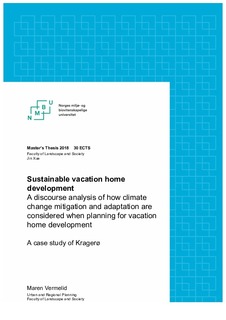| dc.description.abstract | Vacation home lifestyle is regarded as part of the Norwegian culture and tradition, and the number of vacation homes in Norway has now reached the number of 431.028 units (Statistikknett 2018a). The green shift is central in the political agenda, where climate change is considered as one major global concern facing the mankind in the future. However, a steady increase in vacation homes continues in Norway, causing occupation of natural environments, increased mobility and energy consumption.
The thesis aims to investigate the cultural-cognitive dimension of the planning institution in terms of examining the extent climate change considerations are taken into account when planning for vacation home development. With this as research objective, the investigation is conducted by a discourse analysis and a case study. Kragerø is selected as case area, and the discourse analysis is based on a narrative structuring.
The narrative structuring resulted in three storylines, where the storyline Kragerø – a place to live, was analysed to be of great importance and regarded as being the dominant storyline. However, interdependence was detected to the storyline Kragerø – place to visit, and emphasised the desire of further vacation home development. The third storyline, Kragerø – a climate friendly community was analysed to be the least prominent in the planning discourse.
The thesis concludes that climate change mitigation and adaptation to increased extreme weather and changed physical conditions are considered, where climate change is regarded as current and causing uncertain consequences. On the other hand, climate change is to a limited extent regarded in terms of possibly changing the use of vacation homes in Kragerø. Finally, the thesis concludes that the planning discourse act as a barrier for climate change mitigation, as a mediator for adaptation to more extreme weather, and a barrier for adaptation for possible change in use and attractiveness caused of climate change. | nb_NO |

